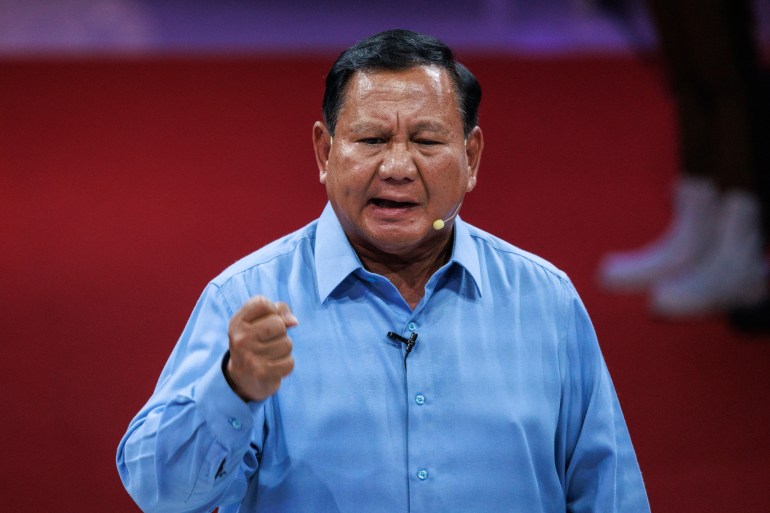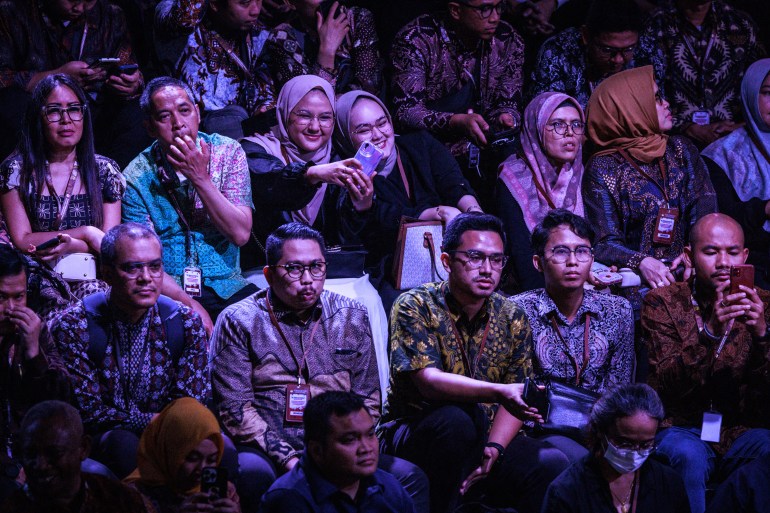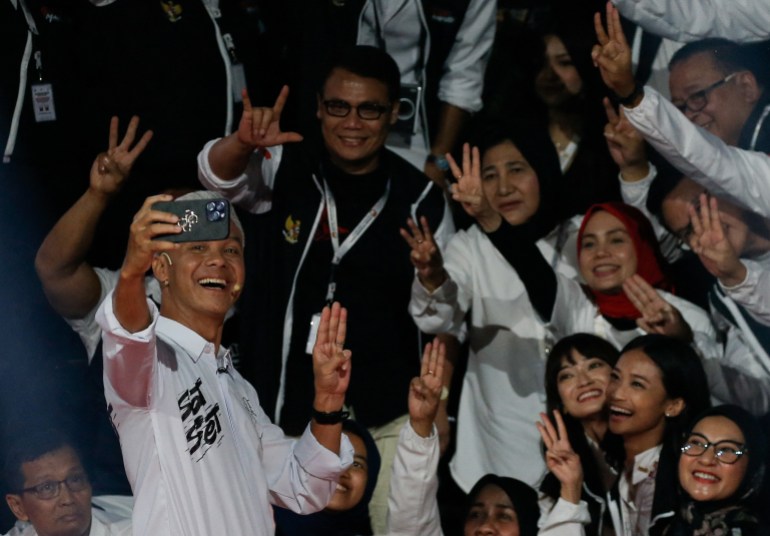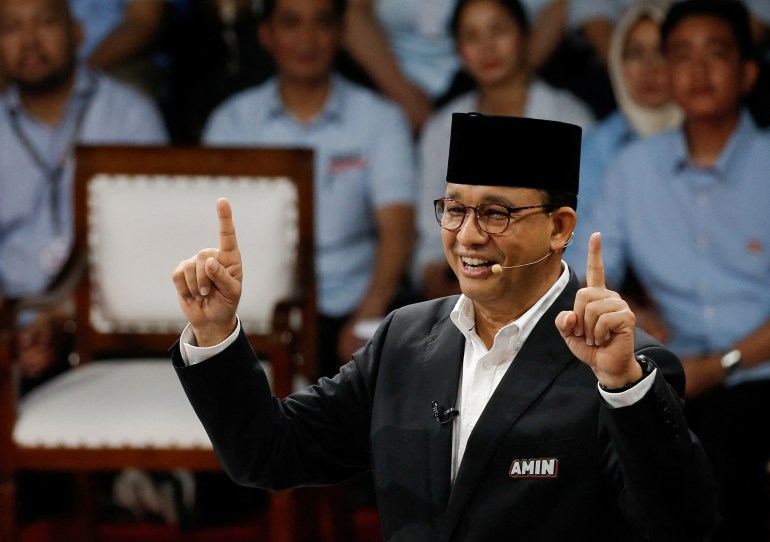The hotly anticipated first debate focused on the theme of law and human rights, with candidates – Prabowo Subianto, Ganjar Pranowo and Anies Baswedan – presenting mission statements before answering questions prepared by experts.
The candidates then asked each other a series of prepared questions in a quick-fire Q&A session.
The debate, which lasted two and a half hours, was at times fiery as candidates sparred over human rights abuses across Indonesia and a recent controversial decision by Indonesia’s Constitutional Court to lower the minimum age limit for elected officials to run for the presidency and vice presidency.
The three men are looking to succeed incumbent Joko Widodo, popularly known as Jokowi, who has already served two terms and cannot run again.
Here are five key takeaways from the debate.
No clear frontrunner
Experts told Al Jazeera that no clear frontrunner emerged from the debate, with none of the candidates managing to land a “knock-out punch” that was likely to change voting projections.
Opinion polls currently put Prabowo, the defence minister and a former general who has twice campaigned for the presidency, ahead of former Central Java Governor Ganjar and Anies, the former governor of Jakarta.
“Generally speaking it was a draw,” said Yohanes Sulaiman, a lecturer in international relations at Universitas Jenderal Achmad Yani in Bandung. “By draw, I mean that it will not change public opinion, which seems to continue to move positively for Anies and Prabowo, and negatively for Ganjar.”

Some polls have put Prabowo 20 points ahead of the other two candidates in recent weeks, although surveys have also shown that as many as 20 percent of voters remain undecided.
“Anies was the most effective at answering his opponent’s questions and attacks, but no one landed a knock-out punch that would change the electoral trends,” Sulaiman said. “For me, this debate was a draw because the movement of pro-Prabowo votes will not stop.
“Maybe the next debate will be more interesting and memorable.”
The next debate is set for December 22 and will focus on defence, security, geopolitics and international relations.
Human rights policies are still unclear
Usman Hamid, the head of Amnesty Indonesia, noted Anies and Ganjar put more emphasis on freedom of expression, accountability for violence by security forces and resolution for past human rights abuses during the debate, while Prabowo “was in full defensive stance and in denial about democratic regression”.
In recent years, Indonesia, the world’s third-largest democracy, has faced allegations of democratic backsliding amid spiralling corruption, attacks on freedom of speech and persecution of minority groups.
Police impunity and acts of violence by the authorities have also been in the spotlight as a result of a spate of high-profile cases.
These have included the deaths of 135 football fans at a match in the city of Malang in October 2022 when police fired tear gas inside the stadium, and the jailing of the former head of Indonesia’s internal affairs department, two-star general Ferdy Sambo, for the murder of his bodyguard Yosua Hutabarat in July 2022.
“Anies and Ganjar actually touched on cases of violence by state apparatus, but did not explain further how to ensure their policy will be able to end the already pervasive culture of impunity in the security forces,” Hamid said.
He added that, when asked about how to resolve gross human rights violations, all presidential candidates failed to demonstrate a new approach to tackle these.
“All presidential candidates should realise that legal uncertainty occurs not only because of a lack of legal assistance, but also the misuse of multiple interpretations of the law to criminalise and intimidate critical voices,” Hamid said.
“This is not a solution to resolve cases of persecution.”

Prabowo’s past in the spotlight
In one of the more memorable sections of the debate, Prabowo was questioned about his past alleged involvement in the kidnappings of student activists in 1998 when he was a commander of Indonesia’s special forces and the son-in-law of former president Soeharto.
Prabowo has also been accused, but never convicted, of human rights abuses in other areas when he was in the army, including in Timor Leste. He was discharged from the military in 1998 following the allegations of student kidnappings and banned from entering the United States until 2020, a year after Widodo appointed him defence minister.
Prabowo has always denied any involvement in the disappearance of the 13 students, some of whom never returned home.
“The fact is those people who were once arrested, the political prisoners, who many people said had been kidnapped by me, now they are on my side,” he said, before turning to his supporters in the crowd including former jailed activists Andi Arief and Budiman Sudjatmiko.
“Neither of the other two candidates pressed Prabowo hard enough about the kidnappings, but perhaps they considered to what extent that would be a vote winner,” Ian Wilson, a lecturer in politics and security studies at Murdoch University, told Al Jazeera. “Prabowo has long tried to craft the allegations as insults which are fundamentally trying to undermine him, and that might have trapped them a bit.”
“Power means that you escape justice, and Prabowo embodies that culture of impunity of the New Order where there has never been any accountability.”

Ganjar fails to make his mark
Both Sulaiman and Wilson said that Ganjar failed to make his mark during the debate, appearing vague on policy issues and choosing instead to appeal to voters from lower socioeconomic backgrounds through a series of folksy anecdotes of having travelled from Sabang in Aceh to Marauke in Papua to meet Indonesian citizens facing hardship.
“That is a well-used trope from [Ganjar’s party] the Indonesian Democratic Party of Struggle (PDI-P) of how they have travelled all over the country and met the average person and listened to them,” Wilson said.
The PDI-P is the ruling and largest party in the Indonesian House of Representatives and is currently chaired by Megawati Sukarnoputri, who was Indonesia’s fifth president.
It is also Widodo’s party and usually campaigns on secular–nationalist issues and the concerns of workers.
Ganjar has so far pitched his campaign as a grassroots initiative which will focus on improving public services and said during the debate that money lost to corruption in Indonesia should be spent on the public instead.
“State losses over the past 10 years have reached 230 trillion rupiah [$14bn]” which is equal to the funding needed “to build 27,000 community health clinics,” he said.
“It is clear that Ganjar is having trouble positioning himself in this election,” Sulaiman said. “He needs sound bites and to be seen as a credible alternative presidential candidate to voters who don’t like Anies, but he did not have a lot of impact in this debate.”
Constitutional Court decision continues to haunt the election
The Constitutional Court’s decision to lower the age limit for previously elected officials from the previous 40 to 35, was heavily criticised across Indonesia and allowed Widodo’s son, Gibran Rakabuming Raka, to become Prabowo’s running mate despite being just 36 years old.
Anies touched on the issue In his opening and closing statements, saying “many regulations have been bent according to the interests of those in power,” and referring to Gibran as a “millenial”.
“There is one millennial who could be vice president, but there are thousands of other millennials […] who care about the nation and who are marginalised,” he said. “When they criticise the government, they face violence and even tear gas.”

The Constitutional Court decision also led Widodo’s brother-in-law, Chief Justice Anwar Usman, to lose his position as head of the court after an ethics committee said he should have recused himself from the proceedings.
During the debate however, Prabowo, who was not responsible for the legal challenge, said that the Indonesian public was the country’s highest judge and it should be left to voters to decide how they felt about the controversy.
“If we are at fault, if we have betrayed people, then it is the people who will punish us,” he said.
